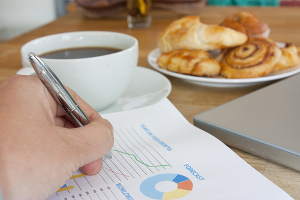The Weekly Round-Up: Breakfast of losers and the ghosts of Christmas gifts past

How often do you 'deskfast'?

Coffee, croissants, the Q3 figures - all the key ingredients for an enjoyable breakfastPhoto: Shutterstock
Breakfast: previously known as the most important meal of the day, our morning repast has now been restyled as the most stressful meal of the day, thanks in no small part to our hectic digital lifestyles.
For most of us, brekkie no longer features a leisurely cup of English Breakfast tea and perusal of a freshly-ironed copy of the morning paper while waiting for the butler to bring in the kippers. Instead, the road to the morning muesli is strewn with inedible digital obstacles.
That's because before you've guzzled your first cup of morning tea you'll have already spent a long time slurping updates from your Twitter stream, while munching through a fat stack of tasteless emails rather than toast.
It seems we now spend a mere three minutes cramming breakfast down our throats because we're too busy checking messages or rushing to get to the office to take our time over the first meal of the day, according to a survey by a breakfast cereal company out this week.
The survey found eight out of 10 people admit to 'deskfasting' three times a week, which is bad enough - but one in 20 people claim they breakfast in the bathroom, which is slightly gross, especially as previous evidence suggests these multitasking masticators are probably on the phone, too.
In light of this research, the Round-Up humbly suggests if you've got to have a conference call earlydoors, it's probably best to schedule it after brekkie, or if a mid-repast meeting is unavoidable, at least make sure you give FaceTime a miss - or everyone involved could end up losing their breakfast altogether.
Email is a wonderful thing: it helps you communicate with far flung teams, sharing information at the speed of light. Why, the very idea of such a practice would have had the paper-shuffling bureaucrats of yesteryear spinning in a whirlwind of their own handwritten memos.
Email is quite simply a must-have business tool that keeps the wheels of commerce turning.
But it is also a terrible, terrible thing.
Every morning, once you've finally choked down an dust-dry energy bar at your desk you can start the grim work of digging through the dark clay of your inbox to find the occasional nugget of gold.
But first you have to ignore the self-congratulatory emails from sales who have sold another 10,000 widgets. Then you have to dodge the preening messages from marketing who have rethought the branding of said widget by changing the logo from green to bright green, and then the congratulatory missives that pour in from colleagues on the genius move.
Only once you've deleted all of this bumf, along with all the usual utterly useless...
... flood of corporate back-covering emails that wash over you every day, then you might actually find the one or two emails that you really need to read. Except by then it's the end of the day and all this email triage will begin afresh tomorrow.
If this all sounds familiar then you might agree with a piece on silicon.com this week that delves into why all these tools that are supposed to make our lives easier seem to end up making slaves of us instead. Its message is: don't blame the poor little computer - if you want to see who the real villain is, look in the mirror.
You see, we're a big part of the problem ourselves, demanding ever quicker responses to email so that nobody can get anything done for fear of missing a missive.
A few years ago, a response to an email was expected within a few days or even a week - but one in four of us now expect a response within the hour, and the majority expect to hear back the same day.
So the Round-Up suggests you kick back and relax. Just as the slow food movement hopes to bring back the fun and enjoyment that has been squeezed out of modern meal times, so perhaps we need a slow tech movement which encourages us only to use electronic communications when we need to, not whenever we can. Who knows - it might even kickstart a trend towards actually talking to people again...
You may have noticed that Christmas is around the corner, which means the Round-Up's annual trudge around the shops to buy tat is only days away. Still, there are now a number of milestones in place to let you know quite how far behind with your Christmas shopping you've got.
We've already passed Black Friday, the day after Thanksgiving and traditionally the kickoff of the festive shopping frenzy. That's rapidly followed by Cyber Monday which is when nobody gets any work done because they're too busy doing their Christmas shopping online. It also seems to be known as Mega Monday too.
The Round-Up hopes that Manic Monday and Mayhem Monday will follow as the frenzy of consumption steps up a gear or two.
But wait - are we entirely losing our minds and emptying our wallets to no purpose?
For while tablets and fancy smartphones are likely to top many geeks' Christmas wishlists, is forking out for expensive presents a complete waste of time?
According to research by Best Experience Days, 78 per cent of men can't remember what gift their partner bought them just one year ago. Women do a little better, but even then 63 per cent of them have forgotten what their partner fought through the crowds to buy. If you think that's bad, only seven per cent of people could remember any presents they received two Christmases back.
Still, if that leaves you wondering whether you could just avoid buying presents for your loved ones altogether, don't. While they might not remember what you did buy them, if you don't buy them anything, they'll never forget it - and they'll make sure you don't, either.